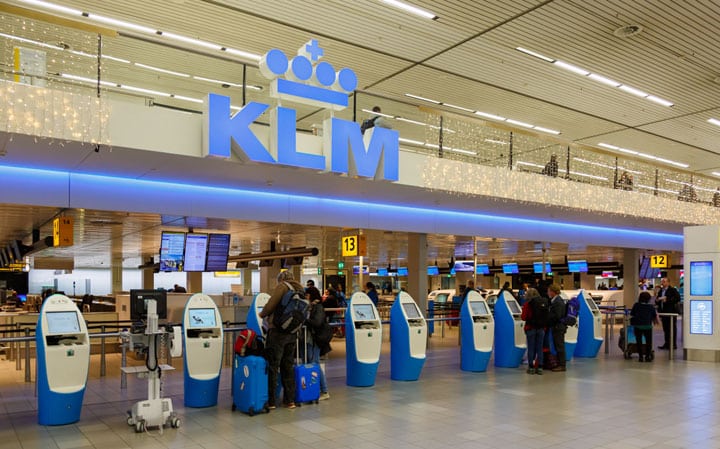KLM reports worst result ever for the first half of 2020

Markus Mainka / Shutterstock.com
The dramatic consequences of the COVID-19 outbreak for aviation are even more evident in KLM's second quarter figures than those for the first quarter. Cargo is doing well, but passenger flights have not yet shown any structural recovery, despite KLM slowly and carefully expanding its network.
In the second quarter, the number of passengers fell by 95% from over 9 million to less than half a million. The operational operating result amounted to a loss of € 493 million. In the same period in 2019, this was still a profit of € 270 million.
The figures for the first half year show a slightly better picture, because KLM performed well before the outbreak of COVID-19 in January and February. Despite this, KLM's turnover in the first six months of 2020 almost halved to € 2,8 billion compared to the same period in 2019. The operating result in the first half year amounted to a loss of € 768 million, compared to a profit from € 223 million in the same period in 2019. A decrease of almost 1 billion.
The capacity has fallen by no less than 50% and the number of passengers by more than 60% to 8,1 million for the KLM Group. KLM transported 6,7 million of these passengers and Transavia 1,4 million. Cargo performed relatively well: the number of tonnes of freight transported amounted to 229.550, a decrease of 22,3%. Despite the decrease in (belly) capacity, only cargo was flown to various destinations instead of passengers. Freight was also transported in the cabin of passenger aircraft.
“These financial results underline the effects of this unprecedented crisis for aviation and KLM. A result of almost €800 million loss in the first 6 months is the worst in KLM history.
In the coming months, KLM will further expand KLM's European and intercontinental network. This is an important, but still limited and tentative step towards recovery. There is still a long and, above all, uncertain road ahead. Despite the fact that much has already been done, further drastic measures will unfortunately be unavoidable.
Despite this incredibly difficult period and circumstances, KLM colleagues are committed to serving our customers. I have great appreciation and respect for that.”
KLM President & CEO Pieter Elbers
Jobs are disappearing
KLM is in a crisis of unprecedented magnitude. Since the outbreak of the COVID-19 virus in early 2020, numerous measures have already been taken to deal with the current situation. The prospects are that the road to recovery will be long and full of uncertainties. This means that the structure and size of KLM will have to be further and radically adjusted in the coming years. As a result, a total of 4.500 to 5.000 jobs (FTEs) will be lost at the KLM Group.
After the corona outbreak, the KLM network was gradually reduced from February to less than 10% of flights at the beginning of April. Also in the second quarter, only 15% of the flights were carried out. In July, 30% of the flights were operated and the load factor lagged behind. The network is currently being slowly and carefully rebuilt, but revenues are still far behind.
The outlook for aviation and KLM is uncertain. Several countries are reversing relaxations in travel restrictions. That makes customers reluctant to book. In all scenarios, demand recovery is expected to last until at least 2023 or 2024. The extent and speed of recovery depend on various factors, such as the development of the virus, the recovery of the economy and customer travel behavior.
Adjusting to new reality
The support from the Dutch government, in the form of a direct loan and guarantee on bank loans for up to €3,4 billion, will enable KLM to cope with the crisis in the coming period. KLM is very grateful for this support in the form of the loan. To ensure KLM's continued existence in the longer term, KLM must adapt in size to the new reality. KLM is therefore forced to reduce the number of jobs to the number needed for the planned operation in 2021/2022. In the course of 2021, from a current total of 33.000 FTEs throughout the KLM Group, the number of jobs must be reduced by 4.500 to 5.000 to 28.000 FTEs.
Due to measures already taken, such as not renewing temporary contracts (1.500 FTE) and the Voluntary Departure Scheme (2.000 FTE), KLM's size is and will be reduced. In addition, due to retirements in 2020 and 2021, among other things, there is also natural turnover (500 FTEs) that contributes to the necessary reduction.
This means that, despite the measures already taken, KLM will still need fewer people in the coming years. In addition, the ground applies that we are dealing with a mismatch in functional skills.
Therefore, alternative solutions will unfortunately have to be found for approx. 1.500 jobs. This concerns up to 500 jobs on the ground, 300 in the cabin and 300 in the cockpit and about 400 at KLM subsidiaries and Air France-KLM group functions.
Given the high degree of uncertainty, KLM is keeping open the possibility of further reducing the number of jobs, should the production level in 2021/2022 be lower than the currently planned -20%.
Trade unions and OR
KLM's restructuring plans are in line with Air France-KLM-wide changes. KLM will be working closely with the trade unions in the coming period on a social plan for each collective labor agreement domain and subsidiary and is of course also in talks with the Works Council about further shaping the restructuring. This also includes the further elaboration of the Dutch government's conditions for the financing package provided. This should be completed in October.

